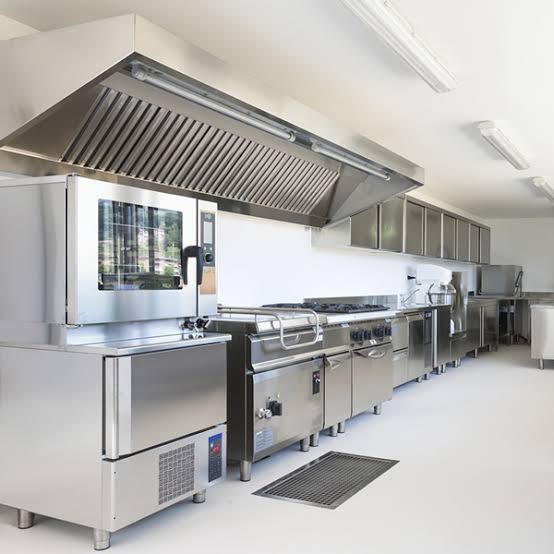
الاسئله الشائعه
kitchen Hood Cleaning in Ajman
TL;DR
- Professional kitchen hood cleaning in Ajman is non-negotiable for fire safety, as accumulated grease in the ductwork is the primary cause of restaurant fires.
- Effective service requires advanced techniques including physical scraping, high-temperature steam cleaning, and pressure washing to achieve complete, bare-metal grease removal.
- Cleaning frequency depends on kitchen volume (e.g., monthly for high-volume use) and is urgently required if signs like rancid odors, poor airflow, or visible grease streaks appear.
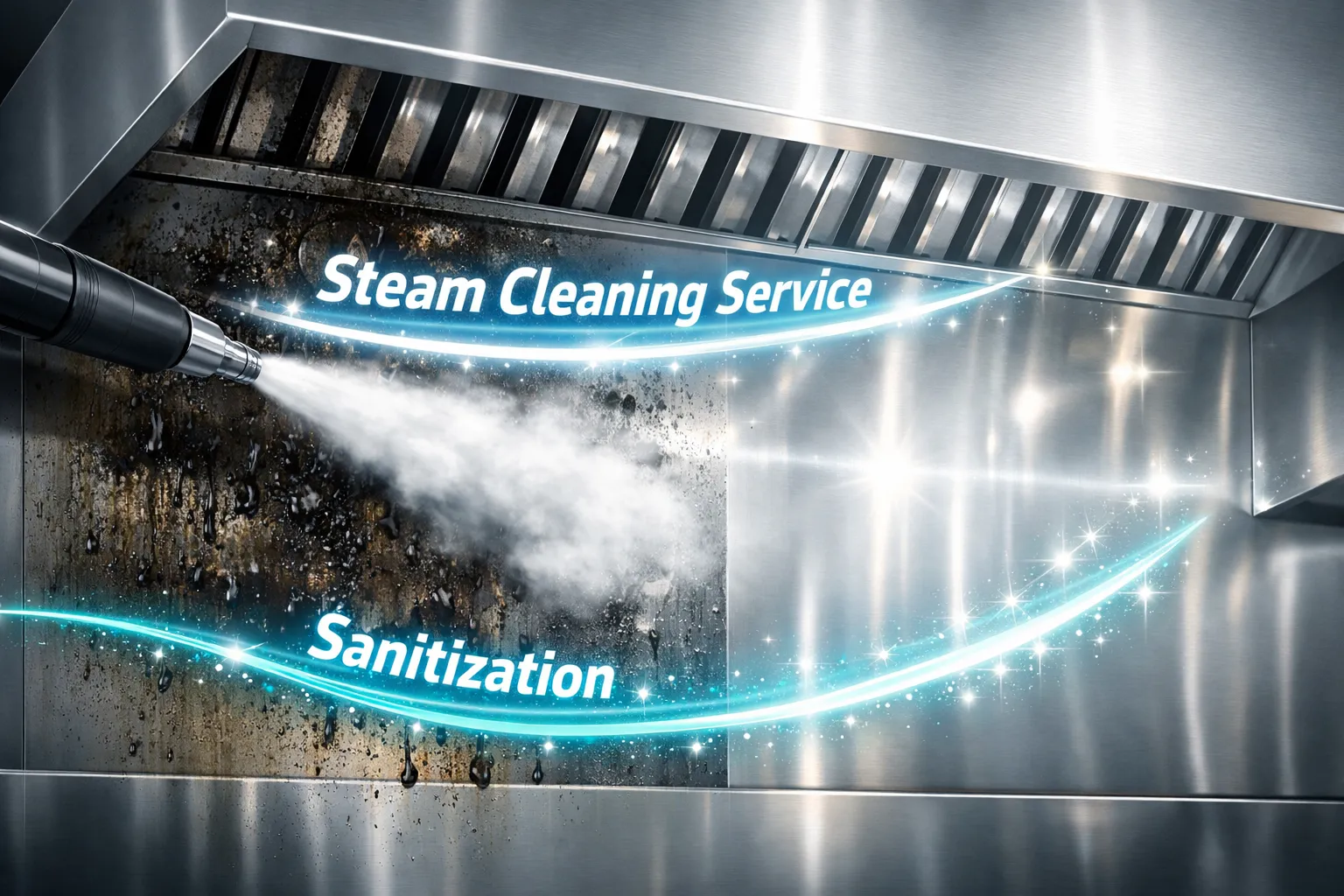
Expert Kitchen Hood Cleaning in Ajman
Maintaining a safe and efficient commercial kitchen requires meticulous attention to the ventilation system. In Ajman, professional kitchen hood cleaning is not just about hygiene; it is a critical fire safety measure. EmirateFix Center offers specialized, comprehensive service for all your kitchen exhaust cleaning needs, ensuring compliance and peak performance.
1. Why Professional Kitchen Hood Cleaning is Non-Negotiable
Commercial kitchen cleaning demands expert attention, especially concerning the ventilation system. Failure to manage internal grease leads directly to operational hazards and inefficiencies.
The Critical Role of Grease Build-Up Removal
Heavy grease build-up is the leading cause of restaurant fires. If left unchecked in the kitchen hood duct cleaning system, accumulated deposits become highly flammable fuel. Our professional service focuses on intensive grease build-up removal throughout the entire ductwork.
Regular, expert exhaust cleaning service drastically lowers fire hazard risks. Choosing EmirateFix Center (0543747022) is investing directly in comprehensive fire risk prevention for your business in Ajman and the wider United Arab Emirates.
2. Ensuring Regulatory Compliance and Safety Standards
Operating a professional kitchen requires strict adherence to international and local safety standards. Compliance is essential for insurance validity and regulatory body inspections.
Adhering to Safety Documentation and Standards
EmirateFix Center ensures your kitchen exhaust system meets all necessary safety standards. We follow international guidelines and local requirements set by authorities like the Ajman Municipality and adhere to the standards of an Environmental Regulator (Tadweer approved company standards).
Our professional kitchen cleaning includes issuing detailed compliance reports and necessary documentation. This certifies that your kitchen duct cleaning Ajman service meets all regulatory requirements, providing complete assurance.
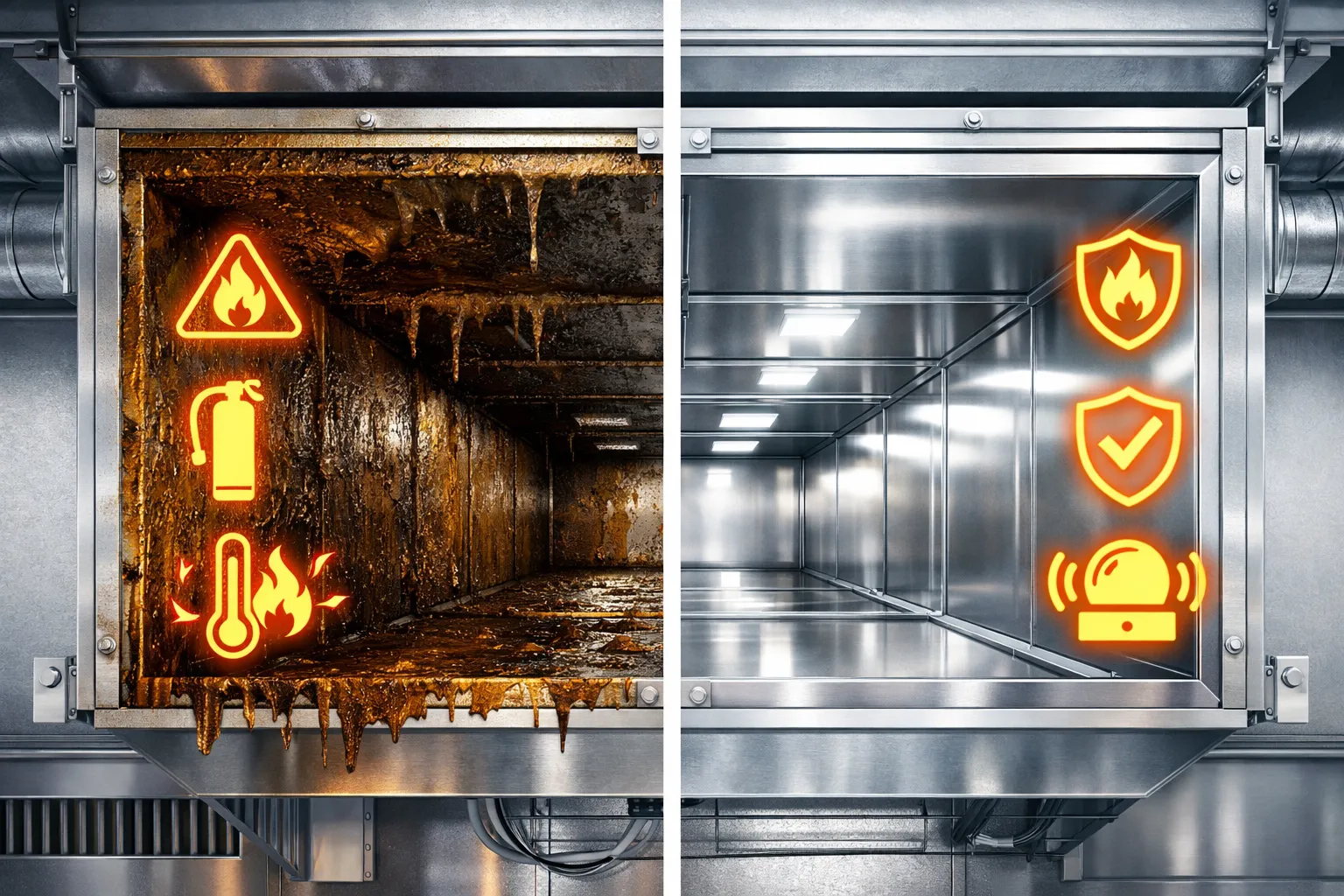
3. Advanced Techniques for Deep Kitchen Hood Duct Cleaning
Effective kitchen hood duct cleaning requires specialized equipment and methods to tackle hard-to-reach grease deposits. We do not just surface clean; we perform thorough system restoration.
Scraping, Steam, and Pressure Washing Service
Our comprehensive approach starts with intensive mechanical scraping, highly effective for removing thick layers of accumulated grease. This is the crucial first step for deep grease build-up removal in the duct work.
Following scraping, we utilize specialized steam cleaning service and high-powered pressure washing service. Steam cleaning is particularly effective for reaching inaccessible regions within the kitchen hood duct, ensuring complete sanitation and disinfection.
4. Determining Optimal Cleaning Frequency in Ajman
The required frequency for your restaurant hood cleaning Ajman service depends heavily on your specific kitchen volume. Setting the appropriate schedule is vital for maintaining peak safety and airflow.
Usage Guidelines for Kitchen Exhaust Cleaning
For high-volume kitchens, especially those using solid fuel, cleaning should be performed monthly. High usage leads to rapid accumulation, necessitating frequent kitchen exhaust cleaning.
Moderate-volume restaurants typically require cleaning every three to six months. EmirateFix Center offers a free inspection and assessment to determine the perfect schedule tailored to your operational needs in Ajman.
5. Maximizing Fire Prevention and Safety Benefits
Regular maintenance acts as a proactive shield against system failure and catastrophic incidents, protecting your assets and personnel.
Reducing Fire Hazards Significantly
The primary benefit of routine commercial kitchen duct cleaning Ajman is the significant reduction in fire hazards. By meticulously removing flammable grease deposits, we prevent potential catastrophic incidents inherent in high-risk kitchens.
Our commitment ensures the full integrity of your kitchen ventilation cleaning Ajman system. This regular upkeep is essential for sustained fire risk prevention across the United Arab Emirates.
6. Recognizing Signs of Urgent Kitchen Exhaust Cleaning Needs
Don’t wait for your scheduled service if you observe clear indicators that your system is compromised. Prompt action prevents system damage and immediate safety risks.
Indicators Requiring Immediate Hood Cleaning
Look for visible greasy streaks or dripping oil near the hood and filters. A persistent, rancid odor emanating from the ventilation system signals heavy grease buildup requiring immediate attention.
Other critical warnings include reduced airflow, excessive smoke leakage during service, or filters that feel sticky to the touch. If your exhaust fan is rattling or performing poorly, it is time for an urgent hood cleaning service Ajman call to EmirateFix Center.
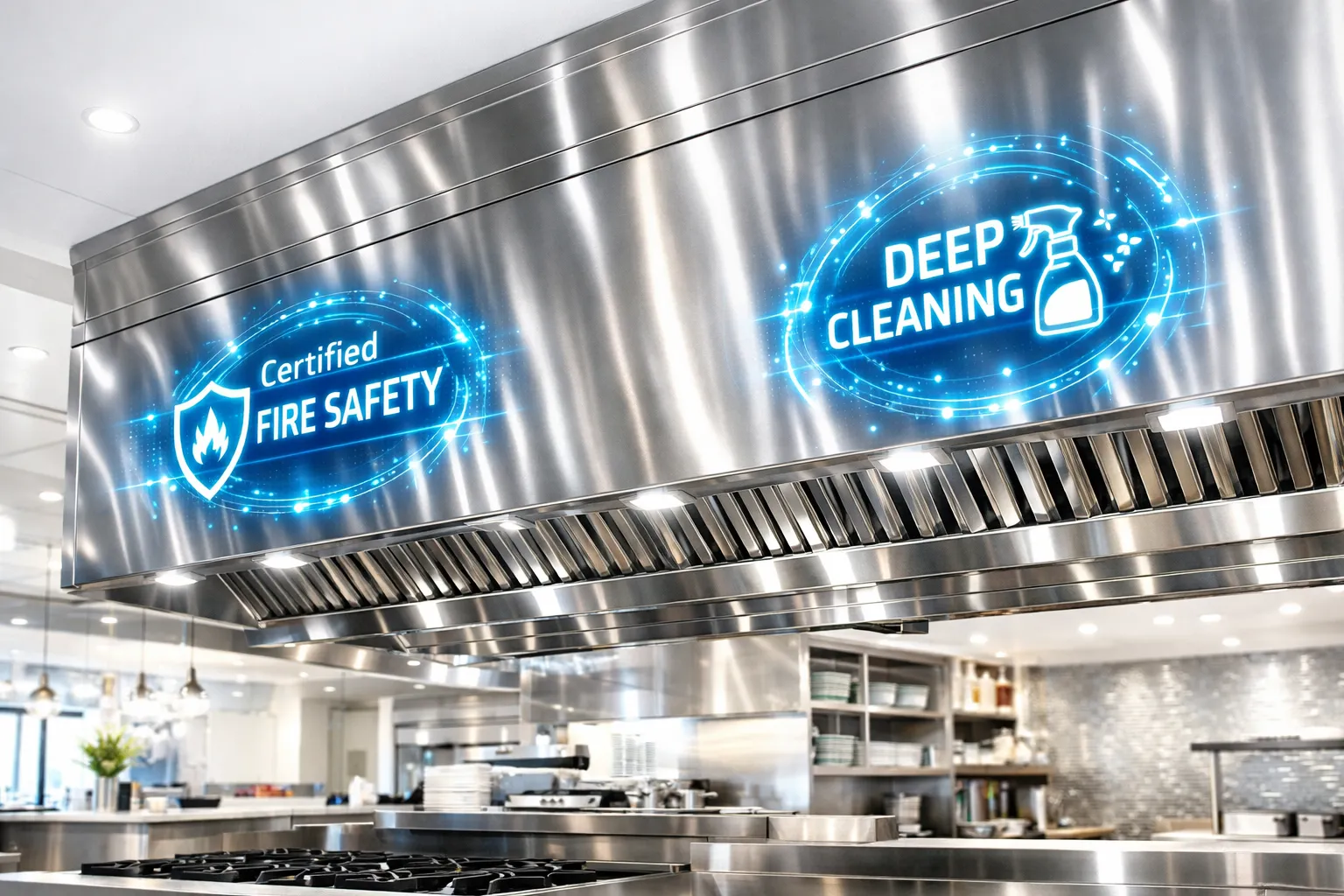
7. Understanding the Cost of Professional Hood Cleaning
We provide transparent and affordable cleaning service tailored to your specific infrastructure, ensuring superior quality without unexpected costs.
Factors Influencing Kitchen Hood Cleaning Pricing
The final cost of kitchen hood cleaning Ajman depends on several factors: the size and number of hoods, the complexity and length of the duct work, and the degree of existing grease build-up.
Pricing may start competitively, but complex systems requiring extensive scraping or specialized access panel installation will incur adjusted charges. We provide a detailed assessment and quotation based on our initial free inspection and assessment.
1. Why Professional Kitchen Hood Cleaning is Essential for Safety
The ventilation system in your commercial kitchen is constantly collecting flammable materials. The heavy accumulation of airborne grease and oil residue within the ductwork poses a significant, unseen hazard.
This critical need for Removal of accumulated grease is the primary driver for scheduling professional Exhaust cleaning service in Ajman.
Critical Fire Safety and Grease Build-up Removal
Grease deposits are highly flammable, making them a leading cause of restaurant fires globally. Regular, deep Commercial kitchen hood cleaning Ajman drastically lowers this hazard.
If the grease layer inside the Kitchen hood duct and exhaust system reaches a certain thickness, high heat or a small spark can trigger a catastrophic fire. EmirateFix Center specializes in complete Grease build-up removal from the entire system, providing essential Fire risk prevention for your business in the United Arab Emirates.
We use advanced methods, including intense Scraping kitchen ducts followed by high-power Steam cleaning service and Pressure washing service, to guarantee thorough cleaning down to the bare metal.
Maintaining Regulatory Compliance and Standards
Professional Kitchen exhaust cleaning is not optional; it is mandatory for safety and insurance purposes. Our services ensure you meet stringent local and international guidelines.
We adhere strictly to NFPA 96 standards and the requirements set by the Ajman Municipality approved guidelines, which are often adopted across the UAE, including Ajman.
Hiring an ISO certified company like EmirateFix Center means you receive official documentation and compliance reports. This paperwork is crucial for inspections by regulatory bodies like Tadweer and verifies your commitment to safety standards.
Restoring Optimal System Performance
A heavily contaminated Kitchen exhaust system struggles to move air effectively. Clogged duct work and exhaust fan blades reduce airflow efficiency significantly.
This inefficiency leads to poor air quality, uncomfortable kitchen temperatures, and increased stress on the ventilation machinery. Effective Duct work cleaning restores the intended airflow and improves operational efficiency.
By investing in professional Hood cleaning service Ajman, you ensure your kitchen remains cool, safe, and compliant, avoiding costly downtime and potential fines.
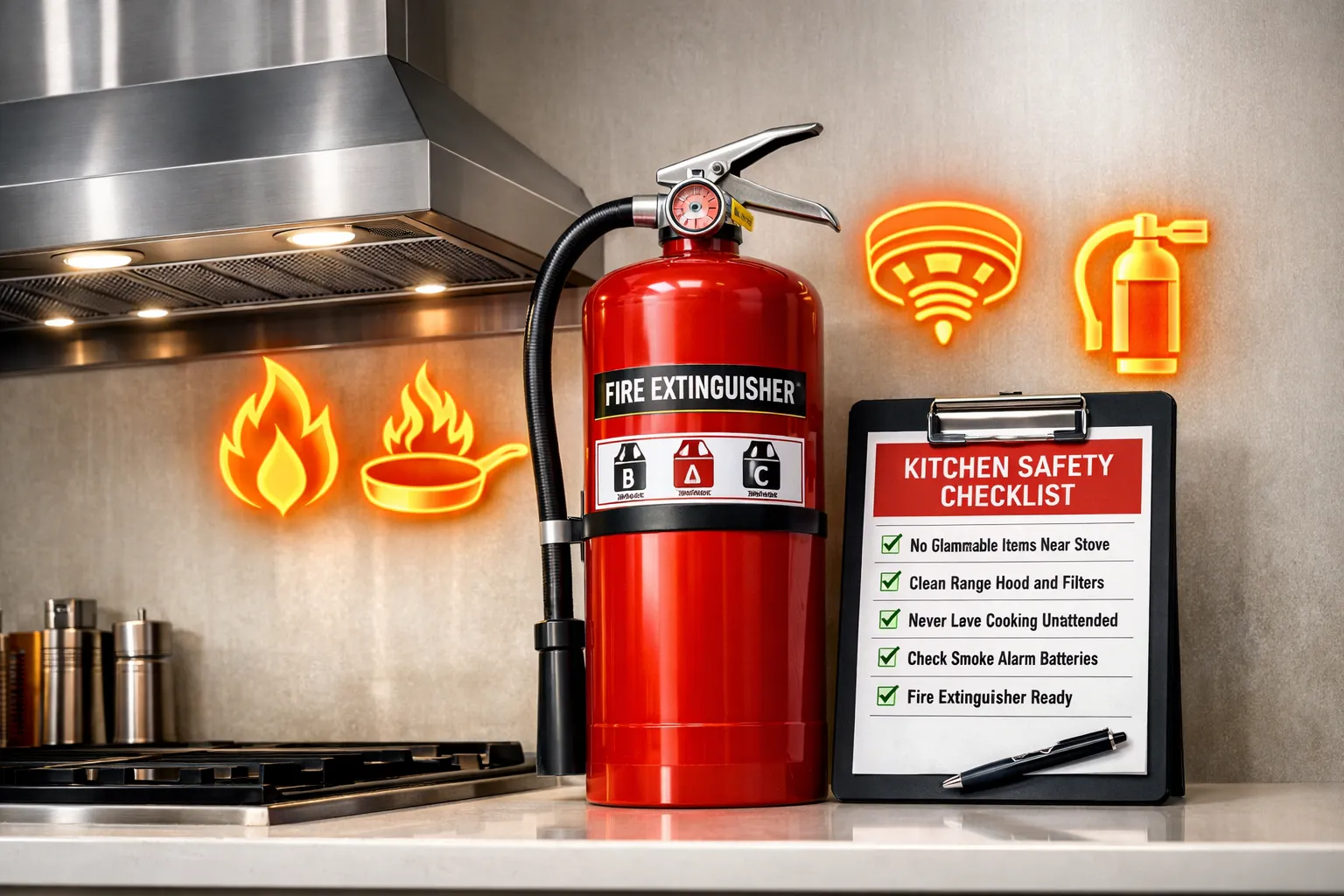
2. Ensuring Full Compliance for Commercial Kitchen Cleaning Ajman
Compliance is mandatory for all commercial operations seeking kitchen hood cleaning Ajman. Ignoring regulatory rules is a serious failure in fire risk prevention and can lead to severe penalties or insurance invalidation.
EmirateFix Center ensures your business meets every standard required by local authorities throughout the United Arab Emirates. Our specialized commercial kitchen cleaning services are designed to secure your operation legally and safely.
Meeting Critical Regulatory Requirements
Our comprehensive exhaust cleaning service strictly adheres to international benchmarks, including the NFPA 96 standard for ventilation control and fire protection.
We follow the stringent local guidelines set by regulatory bodies, ensuring your kitchen exhaust system operates within legal parameters. This is essential for any high-volume restaurant.
The Value of Certified Documentation
A key component of professional service is providing certified documentation. After every kitchen exhaust cleaning session, we issue a full compliance report.
This report confirms that all heavy grease build-up removal has been completed across the entire system. This documentation is critical for insurance purposes and government audits in Ajman.
Operating as an ISO Certified Company
EmirateFix Center operates as an ISO certified company, guaranteeing the highest quality management systems.
This certification confirms our cleaning methods, equipment, and reporting protocols for kitchen duct cleaning Ajman are professional, reliable, and maintained at the highest level of effectiveness.
Reducing Fire Hazard Through Professional Kitchen Cleaning
Professional hood cleaning service Ajman directly reduces your liability. Accumulated grease deposits are the leading cause of restaurant fires.
Regular, certified service significantly lowers fire hazard risks by ensuring the entire duct work cleaning process is thorough, reaching the inaccessible regions of the kitchen hood duct and exhaust fan.
Choosing a certified provider protects your business legally and financially while reinforcing robust fire risk prevention measures.
3. Signs Indicating Urgent Kitchen Hood Cleaning Ajman is Required
Ignoring obvious warning signs dramatically increases the risk of operational failure and catastrophic fire incidents. Recognizing these indicators quickly ensures timely intervention and effective fire risk prevention.
If your commercial kitchen displays any of the following issues, you require immediate professional hood cleaning service Ajman from EmirateFix Center.
3.1. Visible Grease Streaks and Sticky Surfaces
When heavy, visible greasy streaks run down the exterior of the canopy or filters, the system is critically oversaturated. Filters that feel excessively sticky or drip oil indicate that massive internal grease build-up removal is urgently needed. This heavy layer of flammable grease presents a severe fire hazard that must be addressed immediately.
3.2. Persistent Rancid Odors
Unpleasant, rancid smells that linger even after the kitchen has been thoroughly cleaned point to decomposing old grease. This foul accumulation is typically hidden deep inside the inaccessible sections of the kitchen duct cleaning Ajman system, requiring specialized duct work cleaning.
3.3. Smoke Leakage Back into the Kitchen
If smoke, steam, and heat are escaping back into the cooking area during service, the ventilation is severely compromised. This loss of airflow indicates a major blockage, meaning your entire kitchen exhaust system efficiency has dropped to dangerous levels. Immediate commercial kitchen exhaust cleaning is necessary to restore safety and performance.
3.4. Loud or Rattling Exhaust Fan
An unusually noisy, vibrating, or rattling exhaust fan suggests a heavy imbalance. This imbalance is caused by solidified grease accumulating unevenly on the fan blades. This issue reduces overall efficiency drastically and places undue strain on the motor, risking costly failure.
3.5. Noticeable Drop in Airflow Efficiency
The clearest sign is a failure of the system to effectively pull smoke away from the cooking surface. This reduced suction is a definitive indicator that the entire kitchen hood duct cleaning system is severely clogged and requires professional attention to maintain safety and performance standards.
4. The Professional Process: Techniques for Kitchen Duct Cleaning Ajman
Effective grease duct cleaning Ajman is the core of our specialized service. It requires far more than just wiping the visible canopy; it demands specialized tools to penetrate and clean the entire length of the duct work system.
EmirateFix Center ensures comprehensive grease build-up removal, drastically enhancing fire risk prevention and maintaining the optimal function of your ventilation.
Advanced Techniques for Kitchen Exhaust Cleaning
Our methodology for kitchen exhaust cleaning focuses on eliminating dense, solidified grease that poses the highest fire hazards. We utilize a three-step approach for deep, restorative cleaning.
Scraping Kitchen Ducts for Heavy Grease Removal
Scraping kitchen ducts is a critical physical method. This technique is essential for removing hardened layers of grease that chemical agents alone cannot dissolve.
Professional scraping ensures the metal surfaces of the kitchen hood duct are returned to a bare metal condition, which is crucial for safety and regulatory compliance.
High-Temperature Steam Cleaning Service
We utilize a high-temperature steam cleaning service to sanitize and access intricate or hard-to-reach areas of the ducting. Steam effectively liquefies and removes stubborn deposits that accumulate near the exhaust fan and duct bends.
Pressure Washing Service and Certified Degreasers
The final step involves a powerful pressure washing service. This process flushes the loosened grease and contaminants completely out of the kitchen exhaust system.
We combine this with specialized, food-safe foam degreasing agents. These ensure that while we achieve comprehensive duct exhaust cleaning Ajman, we maintain the highest hygiene standards for your commercial kitchen cleaning environment.
Achieving Compliance with Professional Kitchen Cleaning
Our detailed cleaning methodology ensures comprehensive removal of flammable deposits, meeting the stringent requirements for safety documentation.
Choosing EmirateFix Center for your hood cleaning service Ajman means achieving certified safety, documented compliance, and guaranteed performance for your entire kitchen duct cleaning Ajman system.
5. Setting the Right Schedule: Kitchen Hood Cleaning Frequency
Determining the correct cleaning schedule is the most critical factor for maintaining a safe and compliant commercial kitchen. The frequency of your kitchen hood cleaning Ajman service directly impacts fire safety and operational efficiency.
Why Frequency Dictates Fire Risk Prevention
Failure to adhere to recommended intervals leads to rapid and dangerous grease build-up removal challenges. Grease accumulation is the leading cause of restaurant fires. Regular service is essential to meet local regulatory standards for commercial kitchen cleaning and ensure maximum fire risk prevention.
Categorizing Needs for Kitchen Exhaust Cleaning
The necessary frequency for your kitchen exhaust cleaning depends entirely on your cooking volume and methods. EmirateFix Center assesses your operation based on daily usage to tailor the most effective maintenance plan for comprehensive duct exhaust cleaning Ajman.
High-Volume Operations: Monthly Hood Cleaning Service Ajman
This category includes operations running 12 or more hours daily, or those using solid fuels (charcoal or wood grills). Due to the accelerated accumulation of combustible creosote and heavy grease, monthly kitchen hood duct cleaning is mandatory. This ensures the entire exhaust system cleaning process prevents dangerous deposits.
Moderate-Volume Operations: Quarterly Cleaning Intervals
Standard restaurants and busy cafes operating between six and twelve hours daily typically require quarterly service. This schedule is designed to prevent dangerous accumulation while ensuring compliance and optimal airflow through the kitchen duct cleaning Ajman system.
Low-Volume Operations: Semi-Annual or Annual Service
Smaller facilities, such as institutional kitchens, offices, or schools running two to six hours daily, fall into this category. While the risk is lower, professional semi-annual or annual exhaust cleaning service is still necessary to prevent the hardening of long-term residue within the duct work.
EmirateFix Center provides tailored schedules based on a free, on-site inspection. We ensure your hood cleaning service Ajman meets all necessary safety and compliance requirements, specializing in effective grease duct cleaning Ajman for every usage level.
For high-risk environments, such as those using solid fuel, monthly service is mandatory due to the rapid accumulation of combustible creosote and grease, which demands immediate attention from a professional kitchen cleaning expert.
6. Kitchen Exhaust Cleaning Costs and Free Estimation in Ajman
Understanding the investment required for professional kitchen exhaust cleaning is crucial for budget planning. EmirateFix Center ensures transparent pricing based on the specific demands of your commercial kitchen cleaning system in Ajman.
Factors Determining the Price of Hood Cleaning Service Ajman
The overall cost reflects the labor, specialized techniques, and resources needed to achieve full regulatory compliance and remove dangerous grease deposits. We strive to offer an affordable cleaning service while maintaining the highest standard of quality.
A. System Size and Scope
The physical size and number of hoods significantly impact the project scope. Larger canopies and extensive kitchen duct cleaning Ajman across multiple locations naturally require more time and resources from our professional kitchen cleaning teams.
B. Ductwork Complexity and Access
Complex kitchen hood duct cleaning systems, especially those with long, winding paths or difficult-to-reach sections, increase the cost. We specialize in ensuring every section of the exhaust system cleaning is accessible and performed correctly, adhering to Ajman Municipality and Tadweer guidelines.
C. Severity of Accumulated Grease Removal
If your restaurant exhaust cleaning system has skipped maintenance, the level of contamination will be high. Heavy, solidified grease build-up removal requires intensive scraping and extended labor hours, impacting the final price. This intensive work is essential for effective fire risk prevention.
Pricing Benchmarks for Commercial Kitchen Cleaning
While costs vary widely based on the factors above, pricing for a standard, low-volume kitchen exhaust system cleaning in Ajman can start from approximately 800 UAE Dirhams. This provides a baseline for budgeting your safety strategy.
To provide an accurate quote tailored to your establishment’s specific requirements, EmirateFix Center offers a free inspection and estimation. This detailed assessment covers the entire kitchen ventilation cleaning system, ensuring complete transparency and no hidden costs.
Contact us today for your free inspection and estimation to ensure your system meets all safety requirements in Ajman and the United Arab Emirates.
7. Advanced Techniques for Accumulated Grease Removal in Ajman
Professional kitchen hood cleaning Ajman is defined by the effectiveness of its techniques. While many services offer basic filter cleaning, EmirateFix Center focuses on deep Accumulated Grease Removal throughout the entire kitchen exhaust system.
Heavy grease build-up removal is the core component of our commercial kitchen cleaning service, ensuring your system operates safely and efficiently. We address all parts of the ventilation system, from the hood filters to the exhaust fan cleaning and the remote ductwork.
Fire Risk Prevention Through Deep Duct Cleaning
The majority of fire risk resides within the hidden duct work and the kitchen hood duct itself. Grease buildup is a leading cause of restaurant fires, making proper cleaning vital for Fire Risk Prevention.
Our comprehensive exhaust cleaning service significantly reduces fire hazards by eliminating the fuel source, the grease deposits, that can easily ignite in high-heat environments. Regular professional attention is an investment in safety.
Specialized Techniques for Kitchen Duct Cleaning Ajman
To achieve maximum cleanliness, we utilize a combination of rigorous methods. The process begins with specialized techniques for effective grease removal.
We use manual tools for scraping kitchen ducts to remove solidified grease deposits that pressure washing alone cannot reach. This rigorous approach to kitchen duct cleaning Ajman ensures a bare metal clean, meeting stringent compliance standards.
Steam and Pressure Cleaning Service
Following manual removal, we employ advanced degreasing and sanitizing methods. Our team uses high-powered Steam and Pressure Cleaning to sanitize the entire exhaust path, including the hood, filters, and accessible duct sections.
This deep steam cleaning service ensures that bacterial growth is eliminated and surfaces are left completely degreased. Choosing EmirateFix Center for your hood cleaning service Ajman guarantees adherence to the highest hygiene and safety protocols in the United Arab Emirates.
Compliance and Free Inspection and Estimation
We understand that quality service must align with your budget. Before any work begins, we provide a thorough Free Inspection and Estimation to determine the exact level of grease accumulation and the required cleaning depth for your facility.
Our commitment to comprehensive professional kitchen cleaning ensures that you receive the necessary documentation proving compliance with local regulations and industry best practices for kitchen exhaust cleaning in Ajman.
8. Essential Questions About Kitchen Exhaust Cleaning Ajman
What documentation is provided after Kitchen Hood Duct Cleaning?
EmirateFix Center provides a comprehensive service report and a mandatory compliance certificate. This documentation includes detailed before-and-after photo evidence of the duct work cleaning and the entire kitchen hood duct. This certificate confirms that the kitchen exhaust cleaning meets the stringent fire safety regulations set by authorities like Ajman Municipality and adheres to international standards. This report is vital for your insurance and regulatory audits, proving effective fire risk prevention.
How long does Commercial Kitchen Hood Cleaning typically take?
The time required for a full commercial kitchen cleaning depends heavily on the size of your system and the level of contamination requiring grease build-up removal. Typically, a standard restaurant exhaust cleaning Ajman service takes between four to eight hours. We prioritize a customized and hassle-free service experience by offering flexible scheduling, often performing the exhaust cleaning service overnight or during non-operational hours.
Is scraping the kitchen ducts necessary when using Steam Cleaning Service?
Yes, physical scraping is absolutely necessary for achieving full compliance. While advanced techniques like steam cleaning service and high-pressure washing are excellent for sanitization and dissolving thin grease layers, they cannot fully penetrate heavy, carbonized deposits. Scraping kitchen ducts is the essential component of effective accumulated grease removal, returning the metal surface to a bare condition, which is the only way to meet rigorous standards for fire risk prevention.
Do you handle Residential Kitchen Cleaning in Ajman?
While we specialize in complex commercial kitchen cleaning and large kitchen exhaust system maintenance, we also provide expert residential kitchen cleaning services. This includes deep cleaning of home kitchen hoods and exhausts across Ajman. You receive the same high standard of professional kitchen cleaning and quality assurance that our commercial clients rely on.
Why is Professional Kitchen Hood Cleaning Ajman so important for Fire Safety?
Regular, professional kitchen cleaning significantly reduces fire hazards. Competitor analysis shows that heavy grease build-up removal throughout the kitchen exhaust system is crucial because grease deposits are the leading cause of restaurant fires. Our comprehensive hood cleaning service Ajman ensures that the entire ducting system is free of flammable residues, significantly lowering your operational risk and ensuring the safety of your staff and premises.
How often should I schedule Kitchen Duct Cleaning Ajman?
The frequency of kitchen duct cleaning Ajman depends on your kitchen volume, which directly influences the rate of grease accumulation. For high-volume kitchens (24/7 or heavy frying), monthly cleaning is recommended. Moderate-volume kitchens should schedule service every three to six months, while low-volume venues may require annual cleaning. The type of cooking, such as solid fuel usage, also dictates the need for more frequent service to maintain fire risk prevention.
What are the signs that indicate urgent Exhaust Cleaning Service is needed?
You should immediately schedule an exhaust cleaning service if you notice specific warning signs. These include rancid odors persisting after standard daily cleaning, visible greasy streaks or residue on the hood exterior, smoke leakage back into the kitchen during service, sticky or clogged hood filters, or a rattling noise from the exhaust fan cleaning area indicating reduced airflow. These signs mean immediate accumulated grease removal is necessary.
Do you offer Free Inspection and Estimation for Kitchen Exhaust Cleaning?
Yes, EmirateFix Center provides a complimentary, no-obligation free inspection and estimation for all commercial kitchen cleaning requirements in Ajman. Our experts will assess the complexity of your kitchen exhaust system, the level of contamination, and the necessary scope of duct exhaust cleaning Ajman to provide you with a transparent and competitive quote for our affordable cleaning service.
Summary of Professional Kitchen Exhaust Cleaning
Professional kitchen hood cleaning Ajman is the cornerstone of responsible commercial kitchen operation. It is not merely a task for hygiene but a vital commitment to fire risk prevention and regulatory adherence. By choosing EmirateFix Center, you secure an expert partner dedicated to comprehensive kitchen exhaust system maintenance.
We ensure that every aspect of your ventilation, from the hood filter cleaning to the deepest grease duct cleaning Ajman, is handled with precision, utilizing advanced methods like scraping kitchen ducts and pressure washing service.
1. Why Professional Kitchen Hood Cleaning Ajman is Non-Negotiable
The primary driver for professional hood cleaning service Ajman is safety. Heavy grease build-up removal is critical because accumulated grease is the leading cause of restaurant fires globally. Regular, certified cleaning significantly lowers this fire hazard risk.
Our commercial kitchen cleaning services target hard-to-reach areas of the kitchen exhaust system. We ensure the complete removal of flammable deposits, guaranteeing that your operation remains safe and insurable.
Choosing a reliable provider like EmirateFix Center ensures expert execution, unlike superficial cleaning that leaves residual risks lurking in the duct work cleaning.
2. Ensuring Compliance and Regulatory Adherence
Operating a commercial kitchen in Ajman requires strict adherence to international safety standards and local regulations set by authorities like the Ajman Municipality and Tadweer approved company protocols. Failure to comply can result in fines or operational shutdowns.
EmirateFix Center provides mandatory documentation, including a compliance certificate, after every duct exhaust cleaning Ajman. This certificate confirms that the service meets stringent requirements, such as those derived from NFPA 96 standards.
This commitment to compliance is why major industry benchmarks, including those used by companies like Al Waha Hygiene and Service Pro, rely on detailed, documented procedures.
3. Advanced Techniques for Deep Kitchen Hood Duct Cleaning
Effective kitchen hood duct cleaning requires more than simple degreasing. We employ a combination of proven techniques to achieve a ‘bare metal’ clean, which is essential for true fire risk prevention.
Scraping Kitchen Ducts and Pressure Washing Service
Physical scraping is crucial for heavy, carbonized grease buildup. While a steam cleaning service is excellent for sanitization and dissolving thin layers, only physical scraping kitchen ducts can return the metal surface to its original, non-flammable state.
This is followed by specialized pressure washing service using high-grade, food-safe degreasers to flush the entire kitchen exhaust system. This ensures that all residue is removed from the hood and ducting.
4. Determining the Right Frequency for Exhaust Cleaning Service
The required frequency for exhaust cleaning service depends entirely on the kitchen’s volume and cooking style. Establishing the correct cleaning interval is vital for maintaining safety and operational efficiency.
High-volume kitchens, especially those using solid fuel (like charcoal or wood), typically require service monthly. Moderate-volume venues should schedule commercial kitchen duct cleaning Ajman every three to six months.
Low-volume kitchens or venues with simple electric cooking may only need annual cleaning. EmirateFix Center offers a Free Inspection and Estimate to tailor a schedule that fits your specific operational needs.
5. Critical Signs for Urgent Kitchen Exhaust Cleaning
Ignoring warning signs can rapidly increase your fire risk prevention hazard. Knowing when to call for immediate professional kitchen cleaning can save your business.
Key indicators include rancid or strong odors lingering after the kitchen closes, visible greasy streaks or dripping from the hood, and smoke leakage during service hours.
Reduced airflow, rattling sounds from the exhaust fan cleaning Ajman, or filters that feel constantly sticky are also clear signs of severe grease build-up removal necessity in the kitchen exhaust system.
6. Understanding the Cost Factors of Commercial Kitchen Cleaning
The cost of commercial kitchen cleaning is determined by several factors, ensuring you pay only for the service you need. We aim to provide an affordable cleaning service without compromising quality or safety.
Pricing depends heavily on the size and complexity of the duct work cleaning, the number of hoods, and the degree of grease contamination. Complex, multi-level kitchen ventilation cleaning Ajman systems naturally require more labor and time.
While standard services start from competitive rates (similar to industry averages of around AED 800), we provide transparent quotes upfront following a detailed inspection. Our services ensure value through enhanced safety and reduced long-term maintenance costs.
7. Comprehensive Kitchen Ventilation Cleaning Ajman Services
EmirateFix Center provides full-spectrum cleaning solutions beyond just commercial needs. Whether you require restaurant hood cleaning Ajman or residential kitchen cleaning for your home, our expertise covers all scales.
For expert kitchen duct cleaning Ajman, contact EmirateFix Center today at 0543747022 or info@emiratefix.com. We provide the certified, detailed cleaning necessary for compliance and operational excellence.


Comments (0)
[…] Chiller and cold room repair in Sharjah […]